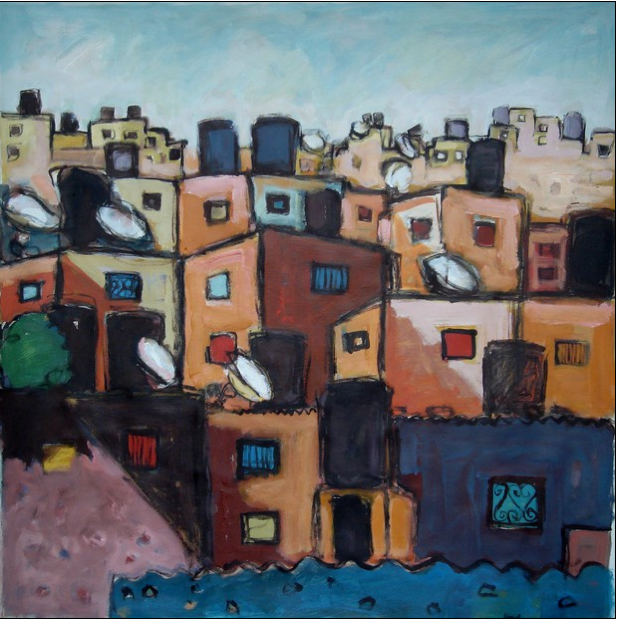Blog from Jonathan Chadwick
The conversation started as it usually does with: ‘How are you? How’s it going?’ The answer the whole world over, even in Gaza, is the same: ‘Fine. We’re fine, my dear’. And we talked like friends anywhere.
It is only later that I ask: ‘So how are things in Gaza?’
I am talking via skype to Hossam Madhoun and Jamal Al Rozzi from Theatre for Everybody in Gaza.
How do you get a sense of what’s happening in a given place at a given time? If someone asks: ‘How are things in London?’ How subjective would my remarks be? Would they really tell anyone anything other than how I was feeling?
Our project is a ten-year partnership between Az Theatre (London, UK) and Theatre for Everybody (Gaza, Palestine), the latest phase of which, is to collaborate on the production in Gaza of an original Arabic stage adaptation of Tolstoy’s War and Peace. You can find out about the event we organised at Rich Mix, London in September to get support for this project here and you can read about audience reactions here.
War and Peace: Gaza (Palestine)/London (UK) is definitely a way of people keeping in touch with what’s happening in Gaza. A part of this blog consists of messages from Gaza during the recent war (Follow the messages from Gaza June- September 2014 from the beginning). Our September event had a live video link conversation with Hossam and Jamal. And our next event on Sunday 18th January at Rich Mix, a public reading of a stage adaptation of Tolstoy’s last novel, Resurrection, will also be followed by a live video link conversation with them. Find out more. Buy tickets.
If you want an authoritative updated report on the situation in Gaza, you can read the United Nations Office for the Co-ordination of Humanitarian Affairs: Occupied Palestinian Territories Report on the Protection of Civilians from the 2nd-8th December here.
So Hossam and Jamal told me how things were in Gaza. They talked about the suspension of cleaning services in the hospitals due to disagreements between Hamas and the Palestinian Authority; the same problem has interrupted the supply of cooking oil to Gaza; in order to balance ‘government expenditures’ Hamas have imposed a tax on cement and this was slowing up reconstruction work; Da’esh (‘What? There’s ISIS in Gaza? I exclaimed) had distributed leaflets outside the University threatening young women if they didn’t ‘cover up’, the same organisation had threatened writers not to contravene religious propriety; there was such chaos in the environment that life was increasingly unbearable and so people naturally turned towards hopes for life after death.
Their friends in the Basma Theatre Company were still touring the UNWRA schools with theatre shows. Also, the actors from their group recently came together to celebrate the work of Philippe Dumoulin. This man was Director of the Theatre du Public in Belgium. He first worked with Theatre for Everybody in Gaza in 1996. This was during a period, just after the Oslo Accords, when Gaza was relatively open and accessible. Theatre for Everybody collaborated on many productions with Philippe and his theatre and now Doudou, as they affectionately call him, was retiring the company made a video tribute. This get-together acted as a catalyst and made the company much more confident that they could start the work on the War and Peace project. They told me that by mid-January they would have accomplished the initial workshops. They may even be able to send some video recordings of the work for our event at Rich Mix on Sunday 18th January.
We also talked about the trip I would be taking in February to Gaza and I told them that I would be doing some work with Ashtar Theatre in Ramallah before trying to get into Gaza. I have been told that it will increase the likelihood of being granted entry if I confirm my desire to go there in person to the Palestinian Authorities on the West Bank. The plan is for Caryl Churchill and I to run an initial workshop on her play Love and Information. This extraordinary play which consists of 49 dialogues with no indication of location or character creates a dynamic network of human interactions in which the poles of communication oscillate around love and information, variations which pull together and push apart qualitative and quantitative relationships at the centre of which there is always a secret, a mystery or a kind of ignorance. It will be wonderful to explore how this work lights up references and instances of Palestinian experience and culture.
Hossam and Jamal know Iman Aoun, the current Director of Ashtar, from the days when the cultural scenes of Gaza and the West Bank were more fluently connected.
We also talked about how the event in January at Rich Mix would be another extraordinary exploration and I told them the story of Resurrection after which we wondered how this word would be translated into Arabic. It refers to both Christ’s coming back to life after the crucifixion and to the personal transformative renewals that people undergo in their lives. Immediately they recognised that there was a double resurrection in the story, both that undergone by Nekhlyudov, who gives up all his wealth and dedicates himself to the well-being of Maslova, the woman he fell in love with as teenager and whom he seduced, and of Maslova herself, who, through her experience of getting to know social revolutionaries in prison, transforms her world-outlook. I explained that it was precisely this concatenation (or chain reaction) of change in people as they interacted on each other that was the main aim of my work on Resurrection.

